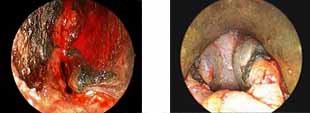Button Battery Injuries in Children: A Growing Risk

More than 3,000 button batteries are ingested each year in the United States. It may be as frequent as every three hours that there is a child in the ER somewhere in this country for a battery-related emergency issue.
Small, shiny and appealing to children, button batteries can result in a major injury and even death if ingested.
What Are Button Batteries?
Button batteries are the small round batteries found in small electronics, such as:
- Remote controls
- Thermometers
- Games and toys
- Hearing aids
- Calculators
- Bathroom scales
- Key fobs
- Electronic jewelry
- Cameras
- Holiday ornaments
As more homes use these small electronics, the risk of these batteries getting into the hands of curious and crawling infants and young children increases.
What Should Parents Do?
Parents and caregivers should not assume that every battery-powered product that enters their home is safe for use by children. In many products, for example, the battery is easily accessible or can fall out when the product is dropped. Make sure that the battery compartments of all electronic items are taped shut and loose batteries are always stored out of children’s reach.
A button battery stops powering a device way before it runs out of a charge. So, what we think of as a “dead” battery still has the charge to harm a child should it get caught in their ear, nose, and throat or swallowing passage. The higher the voltage of the battery (3V vs. 1.5V), the faster the injury.
Symptoms
When a child ingests a button battery, their symptoms could be virtually absent or similar to those of a common infection. This makes it challenging for health care professionals who are evaluating the child.
- When a button battery is placed in the nasal cavity or the ear canal, drainage or pain may be noted, which is not unique to button batteries. Non-specific symptoms combined with an unwitnessed placement can lead to a delay in diagnosis and even greater injury. Batteries that are lodged in the nasal cavity can cause nasal mucosal injury, periorbital cellulitis, scar tissue formation and nasal septal perforation. Injuries in the ear canal include hearing loss, tympanic membrane perforation, and facial nerve paralysis.
- When lodged in the body, the electric current in a button battery rapidly increases the pH of the tissue adjacent to the battery, causing significant tissue injury even within two hours. Esophageal button battery injuries can include esophageal perforation, mediastinitis, vocal cord paralysis, tracheoesophageal fistula, esophageal stricture, or death caused by a significant hemorrhage of an aortoesophageal fistula.

Figure 1 (left): Endoscopic view of button battery injury to nasal septum in right nasal cavity of a child.
Figure 2 (right): Rigid esophagoscopy showing button battery injury extending into the muscular layer of esophagus in a child.
If You Suspect Your Child Has Ingested a Button Battery
If a parent or caregiver is suspects their child ingested a button battery, the child needs to be taken immediately to an emergency room.
Healthcare professionals in the primary care, urgent care, and emergency room setting need to consider that any metallic foreign body in the nose, ear canal, or esophagus is a button battery until proven otherwise.
Diagnosis
The diagnosis can be confirmed on a two view x-ray, which from a distance can sometimes be mistaken for the more commonly ingested foreign body, a coin. See Figures 3 and 4 below. Note: The button battery has the double ring, or halo sign, as opposed to a single ring of the coin.

Figure 3 (left): Double ring, or halo sign, of a button battery in the esophagus of a child.
Figure 4 (right): Homogenous appearance of a coin in the esophagus of a child.
Treatment
The treatment for a button battery stuck within the body is urgent removal in order minimize local tissue damage. Both immediate assessment of the area of battery contact and follow-up surveillance for long-term, delayed complications should be performed to identify acute or delayed injuries.
Awareness is Key to Prevention
Parents and caregivers need to be aware of the risk posed by button batteries in their home. Keep loose and spare batteries locked away and store any product that uses button batteries out of reach. A child’s curiosity can be dangerous. Take the necessary precautions to prevent these situations and be sure you are prepared.
Allied Physicians Group is a partnership of more than 150 dedicated, caring physicians and 350 highly trained support staff. Allied serves over 180,000 patients with offices throughout Greater New York City, Long Island, the Hudson Valley, and beyond. Founded in 2006, Allied Physicians Group is a recognized leader in increasing healthcare efficiencies and patient satisfaction, emphasizing support, innovation, and collaboration. If you are looking for a Pediatrician near you click here or for more information please visit https://alliedphysiciansgroup.com/.
